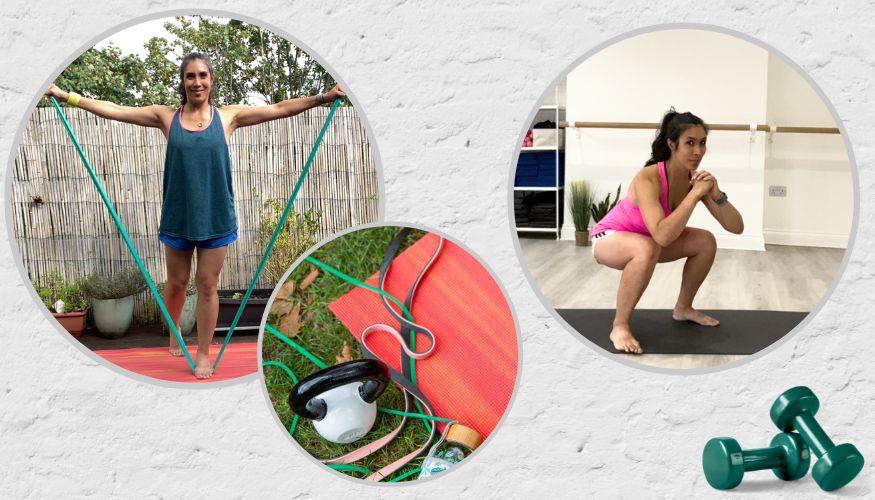Do you know just how heavy babies get?! My eldest is 7 and approximately 25kgs and still expects me to carry him! I’ve had occasions where he was so ill at school that I had to carry him home as he couldn’t walk. A 10 minute walk took me almost twice that! But even babies feel heavy after you’ve been holding them for hours.
Being a mum is like a doing a physical sport every day all the time. You’re weight-lifting, carrying, passing – and that’s just the baby. The pram, the bags, the scooters, balance bikes and shopping all require strength too.
But if you think strength training involves lifting heavy weights and that it’s going to make you look like a bodybuilder, you’re wrong. It’s so much more than that. And while we’re here, please don’t be scared by putting on muscle – there’s nothing more awesome than a strong woman.
Strength training for women is important on many levels; physically and mentally – and it carries with it so many benefits that it seems crazy not to include this into your workout schedule.

What is strength training?
Strength training, also known as resistance training, involves exercises that improve muscle strength and endurance by challenging the muscles against a resisting force. This type of training can include the use of weights, resistance bands, or even body weight exercises, and is designed to enhance muscle tone (the amount of tension in muscles), increase bone density, and boost overall physical strength and stamina. And as I hinted at before, it’s not just about building muscle mass; it’s about improving the body’s ability to perform everyday activities with ease and efficiency, making it particularly beneficial for mums managing the physical demands of parenthood.
The benefits of strength training for women… and especially mums
Increased Muscle Strength and Tone
Strength training helps in building and toning muscles, improving physical power and endurance. This is crucial for daily activities, especially for mums who are non-stop lifting and carrying babies or children, buggies, a variety of vehicles such as scooters and balance bikes, and bags of snacks and other essentials.
Improved Bone Density
Regular strength training increases bone density and reduces the risk of osteoporosis. Women are more susceptible to osteoporosis than men, especially as they age. Osteoporosis is a condition whereby the bones get weaker so are more prone to breaking.
Enhanced Metabolic Rate
Building muscle through strength training boosts your basal metabolic rate (BMR), meaning your body burns more calories at rest. This can help with weight management and also energy balance.
Fewer injuries
By strengthening muscles around crucial joints, strength training enhances joint flexibility and stability, reducing the risk of injury. Your body can feel super strange after you’ve had a baby as the hormone relaxin is still present so stability is even more important.
Improved Posture
If you’ve had a baby recently, have a desk job or sedentary lifestyle, chances are this will affect your posture. Strength training can help correct muscle imbalances so you’ll stand taller and feel better.
Mental Health & Mood Boost
Research reveals that strength training improves mental health by reducing symptoms of anxiety, depression and improving self-esteem. Exercise also releases endorphins which can leave you feeling happier. Plus, it’s often rare to do something just for you as a mum, but exercise is one of those activities – plus, you can do it with your little one there too.
Better Functional Fitness for the Demands of Everyday Lift
Functional fitness refers to the ability to perform everyday activities more easily and safely. Think getting up from and onto the ground, or carrying heavy items, or short bursts of running for the bus or after an escaping child. Strength training enhances functional fitness by building the strength needed for these daily tasks and more, making it easier to carry out routine activities without tiring yourself out so quickly.
Healthy Aging Support
As we age, we naturally lose muscle mass and strength. Grip strength can weaken too. Regular strength training can slow down or even reverse this process. If you want to increase your chances of being physically independent for many more years to come, put the work in now.
Improved Body Composition
Strength training is effective in altering body composition, reducing body fat percentage, and increasing lean muscle mass. This shift in body composition is often more meaningful for overall health than simple weight loss.
Reduced Risk of Chronic Diseases
Regular strength training has been linked to a reduced risk of chronic diseases such as diabetes, heart disease, and certain types of cancer. It improves cardiovascular health, insulin sensitivity, and can help in managing blood pressure and cholesterol levels. Win.
More Energy And Stamina
Life has never been ‘busier’, and it can feel like we’re chasing the morning caffeine hit, just so we can open our eyes in the morning. Put that cup of coffee down – consistent strength training can increase overall energy levels and stamina; just what you need when you’re contending with demanding schedules and a baby who likes to party at night.
Better Sleep Quality
Exercise, including strength training, has been shown to improve the quality of sleep, helping you fall asleep faster and enjoy deeper, more restful sleep. Of course, a good night’s sleep can feel impossible with a baby, but that makes it even more important to get quality sleep.

Strength Training Recommendations
The NHS recommends at least 2 strengthening sessions a week, although this is as part of your 150 minutes moderate activity, so there’s no specific recommended amount of time. Unless your goal is to be a weight-lifter, then even short strength training sessions (and I’m talking a few minutes a day) are beneficial, especially if you’re doing these every day. Strength training for women is important at all stages of life, but especially so as you get older.
It’s also important to take things slow – start off with light weights or few reps and build up. Make your progression incremental to avoid injury.
Also make sure you focus on form and technique. It’s better to go slower and carry out the exercise properly, than rush it.
How to Fit Strength Training Into Your Day
It can feel hard enough getting a few minutes for a shower, let alone an actual workout, but there’s ways to integrate strength training into your day:
Go to a Postnatal Fitness Class
Group classes where you can take your baby and also train are invaluable. Often, babies are so intrigued by what’s going on around them that you should be about to get a decent workout in.
Keep it Short
And I mean really short. You can feel results just from doing a few minutes each day. I swear by micro workouts which for me are 3 exercises which are easy to do ie they require minimal equipment, or equipment which is easily on hand. Every time I have a moment, I’ll do a set of 12 reps or a minute for each. Some days I might get three minutes in, other days it’ll be several sets. Better yet, tie this into a habit. For example, you might do 10 wall press-ups, 10 squats and 10 lunges before you brush you teeth in the morning.
Other 3 exercise workouts could include:
Full body: Squats, Press-Ups, Deadbugs
Legs: Reverse lunges, Good mornings to squat, Side lunge
Arms: Lateral raises, Front raises, shoulder press

If you’re a new mum, prioritise rebuilding the foundations from which you can then build strength. For example, make sure you’ve got a functional pelvic floor and can sync your breathing with your stomach muscle engagement.
Need help with what exercises to do? And motivation?
Need some support working out what strength training could look like for you? Send me a message and I can help you build the strength you need!
Leave a Reply